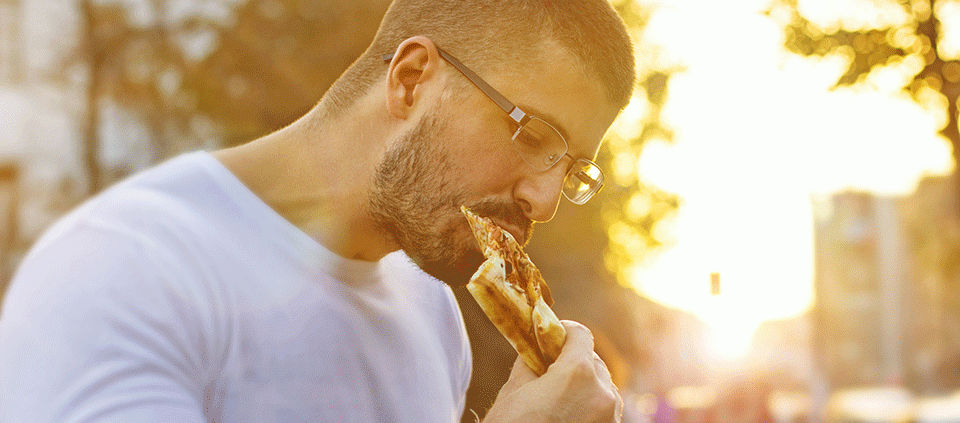How Your Relationship with Food Reflects Your Relationship with Life

by Reyna Eisenstark
Here’s what I remember. I was about 17 or 18, struggling and miserable about my body, a compulsive eater. I can no longer remember where I was (a library? a bookstore?), but I remember the book. It was called Feeding the Hungry Heart, by Kripalu presenter Geneen Roth. It was one of those books that you pick up and realize is the exact book you need to be reading exactly at that moment. I started reading that book exactly where I was and I am certain I did not stop until I was done.
Geneen wrote Feeding the Hungry Heart in 1981, when she had started to explore the idea of compulsive eating as something that went beyond just dieting, and had, in her own life, begun to make peace with food. She went on to write eight more best-selling books, including the number-one New York Times best-seller Women, Food and God, and has written numerous columns and articles in various publications, and has appeared on The Oprah Show, 20/20, The View, The Today Show, and Good Morning America.
For all these years, Geneen has written and talked about food and weight and body image, and her own struggles, in a way that was painfully honest and true. I will never forget how, in one of her books, she explained that her editor had crossed out the term “self-hatred,” which she used to describe how she felt when she ate compulsively, and replaced it with “self-negation,” because she thought Geneen’s choice of words was too harsh. Geneen told her editor, “It’s not harsh enough.”
I wondered whether the current diet crazes, as well as the fat acceptance movement, might impact Geneen’s work—and then I realized that I was asking the wrong questions. Geneen has been following unwaveringly the same path that she set out on nearly 40 years ago. What she finds most compelling is not so much food and diets and fat acceptance, but the way all these things can be “a portal and a doorway into people’s beliefs,” she told me. Everyone has some kind of relationship with food, and somehow this can end up revealing so much, if not everything, about us. Geneen is fascinated by the way that food “can provide a snapshot about what we feel about ourselves and being alive.”
In addition to her books and articles, Geneen regularly leads workshops and retreats on just this topic: how our relationship with food is inseparable from our core beliefs about being alive. Geneen believes that everyone should experience food as something joyous. She is painfully aware that there are many who suffer through their relationship with food, but she wants people to know that it’s possible to end this suffering once and for all.
In her programs, Geneen teaches three key shifts that can “help you achieve your natural weight, make long-lasting changes in your relationship with food, and get back to your body’s knowing that life is meant to be a glorious expression of who you really are.” I asked Geneen what she means by “natural weight,” and she explained it as the weight that your body reaches when you are no longer using food emotionally. Or just about. Geneen recognizes that food can never be entirely detached from our emotions, and that’s okay. She also recognizes that reaching your “natural weight” could take five minutes (maybe you’re already there) or it could take a long time. But getting there is possible.
Geneen points out that what we know as “dieting” is now often disguised as “healthy eating,” but it still rests on the basic concepts of permission and restriction. And, once you realize that, you can start seeing how this relates to a lot more than just food. Geneen describes people on diets as “permitters” (those who have difficult time saying no) and “restricters” (those who have a difficult time saying yes), which speaks to the way we handle many other areas in our lives.
What does Geneen want people to take away from her workshops? “For those about to give up, I would want them to free themselves from discomfort or pain or shame with their relationship with food,” she says. “I’d want them to know that they don’t need to keep this burden around, that it’s possible to feel a freedom and clarity and power in their relationship with themselves.” She offers specific steps that you can take, creating a set of tools that you can use in your life. One of the benefits of coming to a workshop, she says, is experiencing a community and knowing that what you feel is shared by so many people, people who get you.
I remember feeling this way as a teenager, reading Geneen’s first book: “She gets me.” In fact, I was astonished to recognize myself in her book. When you are a teenager, when you are anyone who struggles with anything, it is hard not to feel completely alone. But somehow, all those years ago, Geneen reached out to me through her book and showed me that I was not alone. That, in fact, she knew exactly what I was going through. And that, somehow, she was right there to help.
Reyna Eisenstark is a freelance writer living in Chatham, New York. She writes a blog inspired by stories from her life.